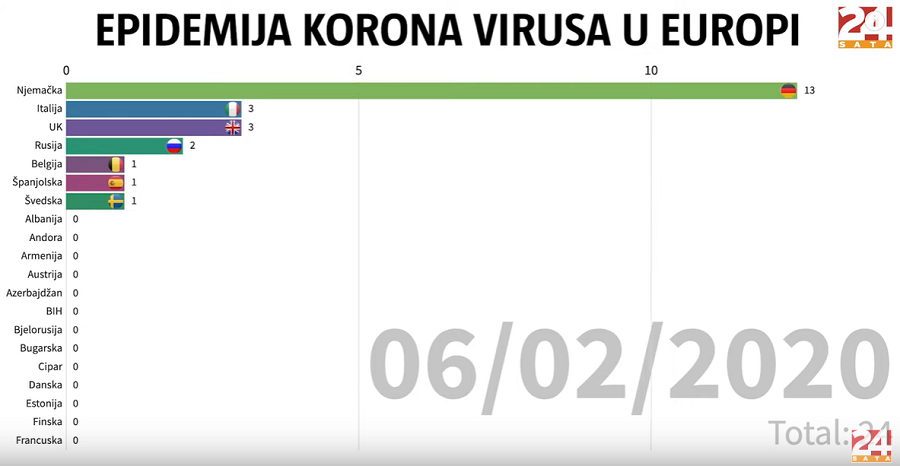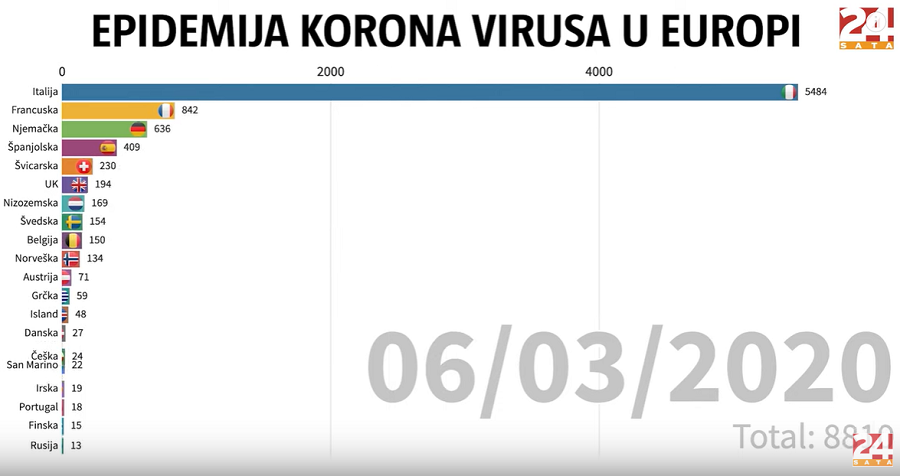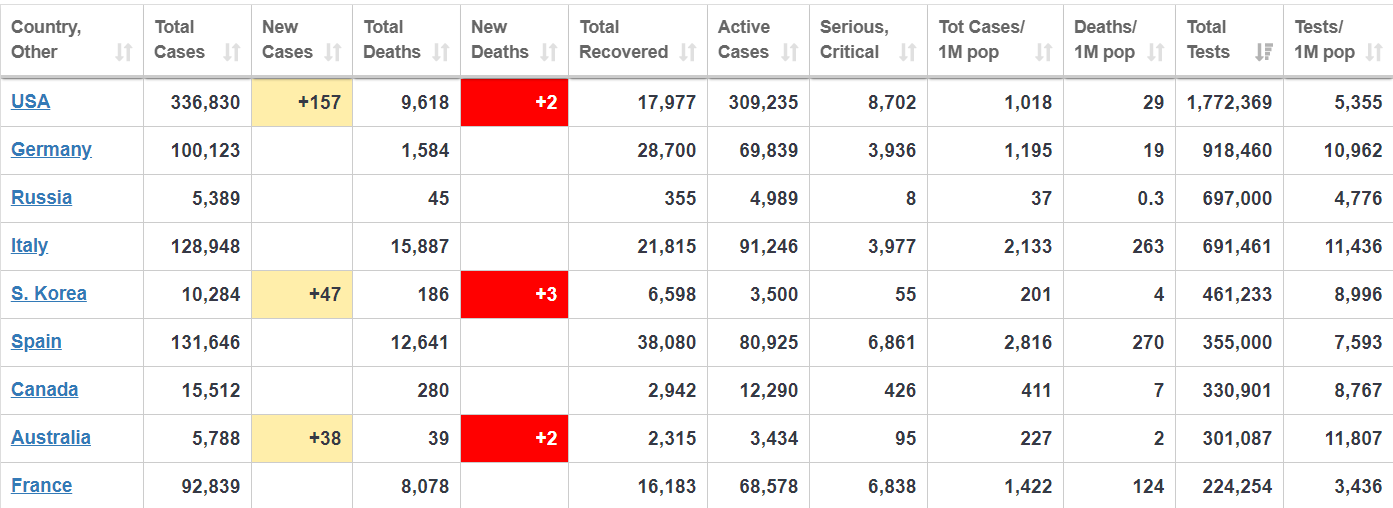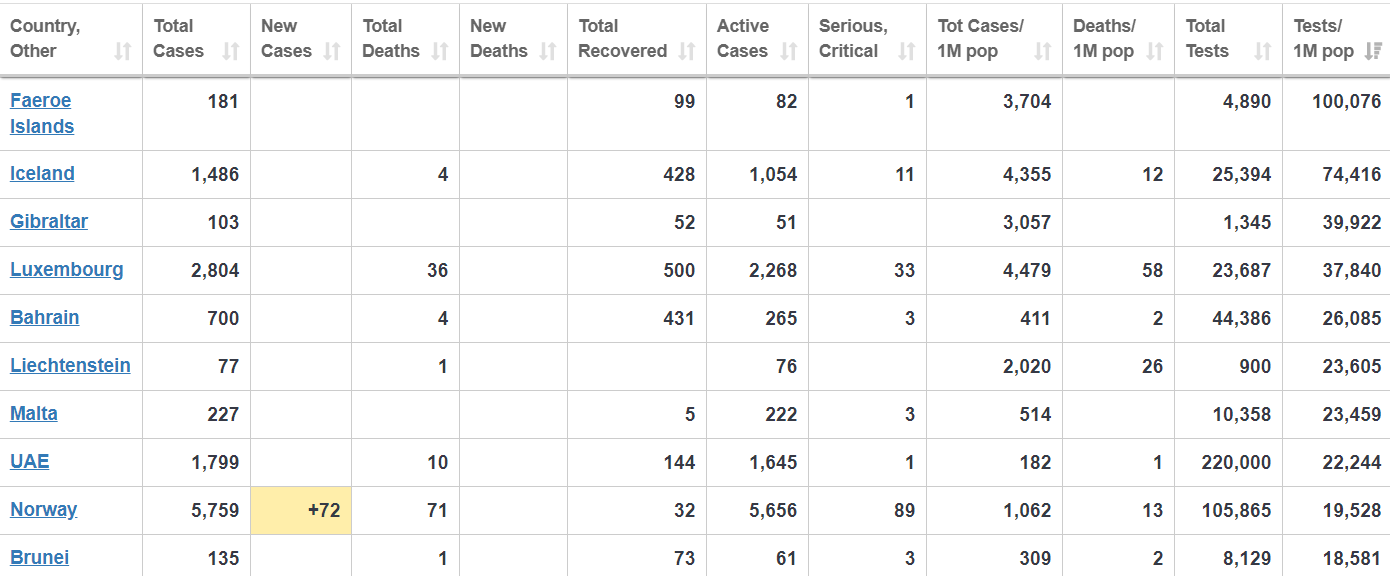24Sata.hr Coronavirus Interactive Graph Charts Daily Spread of COVID-19 in Europe
April 6, 2020 - Award-winning Croatian news portal 24Sata.hr produces a coronavirus interactive graph charting the daily spread of COVID-19 in Europe.
Being in self-isolation, it is hard to judge, but it seems to me that a significant proportion of the human race has become addicted to statistics and charts over the last two months.
How many new cases, how many deaths, is that curve getting flatter - that kind of thing.
Or perhaps it is because of my job running a news portal that I have this feeling, since I am forced to leave and breathe it (behind a mask of course), 24 hours a day.
And speaking of 24 hours, award-winning portal 24Sata.hr has come up with perhaps the most addictive stat counter yet - a coronavirus interactive graph, charting the daily spread of COVID-19 in Europe.
The coronavirus interactive chart, which charts the growth of confirmed cases on a daily basis, is addictive, if very uncomfortable, viewing.
You can, of course, pause the video and see how things were at a given time. Let's take ourselves back to two months ago from today.
Europe looked a little different back then.
Fast forward a month until March 6, just one month ago.
How things will look one month later, we will see next week, as I understand that this coronavirus interactive graph will be updated weekly.
For now, you can view the spread of COVID-19 in Europe from January 31, 2020 to April 3, 2020.
Svaka cast to Boris T. and the 24Sata.hr team - I would have preferred that the topic was a happier one, such as number of returning tourists. Perhaps we will have that too one day.
You can follow all the updates, as well as see more video content from the 24sata team on their official YouTube channel.
For the latest on the coronavirus crisis in Croatia, follow the dedicated TCN section.
Highest Sales Growth Recorded in Second Week of March
ZAGREB, April 6, 2020 - The results of an analysis of consumer behaviour in Croatia during the coronavirus epidemic, conducted by the global data analytics company Nielsen, have shown that the highest sales growth was recorded in the second week of March and that there are six stages of consumer behaviour during this crisis.
The first stage is proactive health-minded buying, which started at the end of February.
The first case of the coronavirus infection in Croatia was confirmed on February 25, and already in the week from February 23 to February 29 there was a significant increase in the sales of certain products compared to the same week last year. For example, tinned fish had a sales increase of 159%, pasta of 114%, flour of 108%, and rice of 97%.
The highest sales growth occurred in the second week of March, from March 9 to March 15, when retail chains saw an average increase of 65% on the year in the shopping basket value.
According to Nielsen, shoppers then entered the second stage of consumer behaviour - pantry preparation.
In that period, the sales of flour rose by 410% on the year and the sales of rice by 301%. When it comes to drugstore products, soap saw a sales increase of 232%, and toilet paper of 162%.
Nielsen says that in the third week of March, from March 16 to March 22, sales growth rates slowed down due to a decline in store visits and operational restrictions in the retail sector.
The decline in store visits did not result in lower consumption, and the shopping basket value had an increase of 46% on the year. That was the third stage - quarantined living preparation.
Nielsen says that we are currently in the fifth stage, restricted living, which will be marked by demand for online shopping services and when everything will depend on high delivery standards.
The final, sixth, stage will be when people return to their daily routines and that will be living a new normal, Nielsen says, adding that consumers will focus more on their health and hygiene practices.
The concern shared by consumers in Croatia and around the world, as well as the effect of new behaviour will decrease over time, but it will not go away completely. Companies that recognise that as soon as possible and adapt to new needs will succeed, Nielsen said.
More coronavirus news can be found in the Lifestyle section.
Croats Repatriated from Austria, Italy
ZAGREB, April 6, 2020 - On Sunday evening, 111 Croatian nationals were repatriated from Tyrol, Austria as well as 22 from Ancona, Italy, the Foreign Ministry said in a press release.
The Croats returned from Tyrol, which is quarantined, in six buses and four cars to the Bregana border crossing, where they were checked by epidemiologists and instructed to self-isolate.
The Foreign Ministry thanked the Austrian authorities for approving the repatriation and said it would continue to work on the repatriation of Croatian nationals who happened to be abroad during the COVID-19 pandemic.
A Jadrolinija catamaran docked in the Zadar port with 36 passengers, including 22 Croats, where epidemiologists took swabs, measured their temperature and instructed them to self-isolate for 14 days.
The other passengers were 11 Montenegrin citizens, one Bosnian, one Italian and one French citizen. The Italian and French citizens will stay in Zadar County while the others will be escorted to the border by police.
The repatriation from Ancona was organised by the Croatian government.
More coronavirus news can be found in the Lifestyle section.
How Does Amount of COVID-19 Testing in Croatia Compare Globally?
April 6, 2020 - How does the amount of COVID-19 testing in Croatia compare with the rest of the world? A look at the numbers via the data of Worldometers.info.
The response to the coronavirus pandemic has elicited very different responses from a number of countries. The lockdown in China has proved extremely effective, whereas the more relaxed approach of Sweden is perhaps the most controversial strategy for a country trying to fight corona without major disruption to the economy. As we are living in a great unknown, far be it for me to judge who has the right or best approach, certainly at this stage.
One topic which is discussed at length is testing. Is there enough testing, and how many tests have been conducted in a given country.
As one has come to expect form the fantastic Worldometers.info website, there is a column of global data for that. Actually two, total tests and number of tests per 1 million population. So where does Croatia sit in all this?
President Trump no doubt likes this chart, with the United States the clear leader in the number of tests conducted (which will, of course, be a large contributing factor to the large number of confirmed cases in the US). At almost 1.8 million tests, this is almost twice as many as the next country, Germany.
He is probably less likely to talk about this chart, which puts the 5,355 tests per million population in the States at number 41 out of the 208 countries being tracked.
And Croatia? There is concern at the last of COVID-19 testing in Croatia in some quarters.
According to the data provided, 10,874 tests have now been conducted in Croatia, which places Croatia 63rd in the table of tests conducted.
Croatia is, of course, a small country, and it jumps 10 places to 53 in the table of number of tests per 1 million people - 2,649.
The website has now added a dedicated page for Croatia, where you can see more detailed data about the current situation here.
For the latest on the coronavirus crisis in Croatia, check out the dedicated TCN section.
Tourism Minister Gari Cappelli on What Awaits Croatia in 2020
April 6, 2020 - Croatian Tourism Minister Gari Cappelli talks about what awaits Croatian tourism in 2020.
In the past few days, the eyes of hundreds of thousands of people in the country have been hooked on the Ministry of Tourism and the Croatian Government in anticipation of financial assistance and relief that will make it easier for them to survive the (non) tourist business year.
Because, apart from the fact that, in Croatia, every fifth kuna comes from tourism spending, the country has about one hundred thousand employees in the sector, and another 108 thousand families engaged in family rentals. There are also some fifty thousand who earn their salaries in the hospitality industry, and who knows how many other services that are directly or indirectly related to the profits from tourism.
All of them are on the same side in the tourist supply and demand chain in Croatia. Because not only is the season a success for tourist workers, but every hairdresser is hoping for a good season, because if their clients do not make money, they will not get their hair done. The same goes for the butcher, the furniture dealer, the pedicurist, the friend who pays the mobile operator, the carpenters, the souvenir and car salespeople, and the colleague who works at the bank.
With this thinking in mind, and while preparing for another fruitful tourist year, which began well with bookings, the news of the coronavirus pandemic threatened tourism for the first time since the war.
There is still no answer to the uncertainty that hit us one month ago, and we can’t say what this year's tourist season holds - or if it will be held at all.
Thus, Slobodna Dalmacija interviewed Croatian Tourism Minister Gari Cappelli to find out more.
The international travel market is completely dead. What information and estimates on the duration of the crisis do you receive from our representatives and partners abroad, how long could it last?
“We are in contact with our seventeen representative offices of the Croatian National Tourist Board all the time, and we receive reports daily. We are also involved in international tourism organizations, with several videoconferences. As the World Tourism Organization has announced, the expected decline globally is 30 percent.
We know how important tourism is for many national economies, and the coronavirus pandemic has directly impacted the tourism sector. Travels from China dropped sharply in January and February, expanding to the rest of the world in February and March. The tourism economy is now stalled in many countries around the world and is likely to remain so until at least the middle of this year.
Restrictive measures are in place, and even when tourism supply chains start functioning again, the recovery will take some time, given the interconnected effects of the economic and health crisis and the gradual lifting of travel restrictions. This will have great consequences for many national economies."
There is an ongoing cancellation of arrivals even for the main season or bookings postponed to 2021. Do you think that the Croatian Government's measures will enable the tourism sector to survive this business year?
“It is currently understood that bookings have stopped and bookings for the following period are canceled. We must also look at it from the point of view of safety and health protection, and not primarily through the loss of tourist traffic. At this point, long-term assessments are difficult to determine, given the unanticipated course of the coronavirus pandemic development.
The package of measures of the Croatian Government for the economy is worth tens of billions of kuna, and the measures apply to all departments that need intervention in this situation. A large part of the measures relates to the preservation of liquidity and the preservation of jobs.
We are aware of the fact that the tourism sector has been significantly affected by this pandemic and, therefore, we have hastened to devise and adopt measures that we believe will help overcome this challenging period. It is important to note that the Ministry of Tourism and the Croatian Government will continue to take short, medium and long-term measures to minimize the effects and impact of the current situation on tourism and other economic segments."
What are the specific measures of the Croatian Government intended explicitly for tourism and how much will it help the sector?
“Measures include, among other things, securing loans for liquidity and working capital, introducing a moratorium on credit obligations, and establishing a new financial instrument, COVID-19 Loans, for working capital for small and medium-sized enterprises. The Ministry of Tourism introduced a deferral of payment of the tourist tax as part of the Government's measures, while the Ministry of Finance made it possible to defer the payment of a flat-rate income tax through amendments to the General Tax Law.
In addition, the payment of the concession fee on tourist land co-owned by the Republic of Croatia is postponed to mitigate the first financial impact on the tourism sector."
What is the overall financial burden on the sector through the most important measures?
“The relief from the tourist tax is estimated at HRK 164 million, while the exemption from paying the variable part of the concession fee will relieve the tourism sector by about HRK 15 million. Furthermore, within the measures of the Ministry of Labor and the Pension System, the duration of the “permanent season” measure is extended so that seasonal workers receiving off-season benefits do not lose their jobs.
To extend this measure, the state will provide HRK 11.5 million, and the measure includes about five thousand permanent seasonal workers in tourism and agriculture."
At this time of crisis, a public pandemic sometimes gives the impression that tourism is being marginalized over some other industries that are being touted as more important. Is that correct?
“Tourism is a sector that accounts for almost 20 percent of Croatia's GDP and, in addition, is a horizontal industry that provides revenue and jobs to a number of related industries. Therefore, together with other sectors in the Croatian Government, we will find the right balance of measures for all sectors affected by the current crisis, and tourism will certainly receive the deserved place and the help it needs to overcome the current state and the period that follows after the crisis."
Are you satisfied with the cooperation of professional tourism associations with the Ministry and how do you communicate during this crisis?
“In such crises, frequent interaction between the public and private sectors is needed to act promptly. I believe that the entire tourism sector supports the efforts made so far to overcome the economic and other challenges as effectively as possible.
We are continually receiving valuable suggestions for overcoming this situation by various professional associations active in the tourism sector, and we are constantly reviewing and trying to incorporate the legislative changes and economic measures of the Croatian Government, which will be adopted in several circles."
What would you say to family renters who have already mentioned in a survey that they lost about 50k in this year and fear the losses will be much higher?
“Household accommodation accounts for the largest share of the Croatian tourism accommodation offer and, therefore, private renters are essential stakeholders in our sector. I believe that a lot of them have lately lent themselves to invest in increasing quality and expanding their supply. With the turnover and revenues we have generated in recent years, such an investment has been logical and sustainable
However, in times of financial crises such as this one certainly is, the tourism sector is always one of the first to suffer, but experience has also shown that it is among the first to recover. Moreover, tourism is said to be the driver of economic development after the crisis. Therefore, we have abolished the payment of half the amount of the annual lump sum of tourist tax for basic beds and the whole amount of lump sum for extra beds to the persons providing catering services in households and on farms.
In addition, the Croatian Government will do everything possible to free the sector of all benefits, to provide a moratorium on loan repayments, etc., so that private accommodation will be that generator of growth after these troubles."
In the current situation, many think about the time after the pandemic, and the solution is seen in domestic tourism. How realistic is this in a position where half a million employees in the country are at minimum wage?
"Croatia, headed by the Civil Protection Headquarters, manages the emerging health situation well and, despite a further increase in the number of patients, the spread of the infection is under control, which means that we have prepared better than many European countries.
I believe that Croatia is still a safe country, and I believe that, after the health crisis and the gradual loosening of restrictions on work and movement, Croats will be able to spend at least part of their holidays at sea or in the continental part of our country.
As for their consumption, it is difficult to predict how much it will be. This will depend on the scale of the latest economic crisis we are currently in, and it is very difficult to estimate how long it will take."
Will the government encourage vouchers or otherwise promote domestic travel and the recovery of the sector after the pandemic?
“We have prepared projects such as the already widely known Croatian Tourist Card (CRO card) and the action "A Week Off is Worth It", which, unfortunately, was put to rest due to the coronavirus pandemic. All the necessary remodeling for both projects aimed at stimulating domestic tourist consumption has been completed, and I believe we will be able to use them to encourage domestic travel after the normal tourist flows are restored.
In addition, the amendments to the Law on the Provision of Tourism Services gave the Minister the power to regulate in the circumstances of special circumstances. Thus, this means terminating travel contracts in a package arrangement in such a way that tourist agencies may offer vouchers to be secured insurance policy, instead of refunding for unrealized travel."
Do you think that the position of Croatia and the fact that we are an easy-to-reach destination by car will be our trump card in the recovery of tourism?
“I still sincerely hope that we can make up at least part of the tourist season. If so, if the situation calms down, the rest of the tourist year will be marked by "last-minute" trips. In such a scenario, it will certainly help us to be close to our most significant markets. But in addition, our reputation and recognition that we have built in recent years will also help us, and it is primarily about hospitality, safety, quality and nature conservation."
The Croatian National Tourist Board system is financed almost exclusively by membership fees and tourist tax, which will not be paid in the next 3 + 3 months. Many tourist boards are already empty accounts. How will they be helped to survive without a basic income?
“Given the measures adopted by the Croatian Government to assist the economy, which partly relate to the delays in paying tourist membership fees and tourist fees, we have taken certain steps and arrangements with the Croatian Bank for Reconstruction and Development regarding securing funds for the liquidity of the tourist boards system.
HBOR will enable the monitoring of legal entities under the program Sustainable Current Assets through commercial banks. In preparing the new measures, HBOR will take care of the tourist boards and include them in the eligible legal entities for financing under the Risk Sharing Model together with commercial banks, as well as for potential direct funding."
The responsibility to lend to the tourist boards will lie with the presidents of the tourist boards, i.e., the prefects, mayors, counties?
“Amendments to the Law on Tourist Boards and Promotion of Croatian Tourism, adopted at a cabinet session Thursday, enabled higher financial borrowing by tourist boards in times of special circumstances, and Tourist Board presidents will decide on the amount they need to borrow to maintain work.
Amendments to the same Act also gave the Minister the power to determine by an ordinance an amount that could be used for the salary costs of employees in the tourist board, which had hitherto been limited to 40 percent of income."
If you were a casual tourist worker currently without traffic and income, what would you say to Minister Cappelli at this point, what is the most important thing to do?
“The most important thing is to ensure the retention of jobs and the liquidity of companies and trades in the tourism sector so that they can resume work as soon as possible after the crisis. In addition, it takes a lot of patience, concern for the health of everyone in the sector, and the conviction that we will emerge even stronger from this situation, with new experiences to overcome difficulties."
To read more about travel in Croatia, follow TCN's dedicated page.
Corona Voices in the Croatian Diaspora: Lidija in Ireland
April 5, 2020 - With as many Croatians living abroad as in the Homeland, what are the diaspora experiences of self-isolation? In the second of a new series, Corona Voices in the Croatian Diaspora, Lidija Ivanek SiLa on the current realities in Ireland.
Last week TCN started a feature series called Foreigner Self-Isolation In Croatia: Do You Feel Safer? I can honestly say we have never had such a response or so many incredible contributions. The countries of origin of these expats in Croatia literally from all over the world. So far we have had submissions from expats from Romania, USA, Ireland, UK, Mexico, Argentina, Spain, Singapore, Holland, Canada, India, Hong Kong, Venezuela, Latvia, China, Honduras, Hungary, Moldova, new Zealand and Germany. You can see all their stories here.
Given the success of the series (still going strong) and large interest, it made sense to expand it to look at this from another angle - how Croatians abroad are coping where they are. If you would like to contribute your story to Corona Voices in the Croatian Diaspora, please find the submission guidelines below.
And now, let's hear how Lidia Ivansk SiLa is getting on in Kinsale, Ireland.
Firstly, how are you? Are you alone/with someone? Tell us a little about your situation and sanity levels.
We are doing well, thank you. I live with my husband and we get along really well even in these extraordinary, confining situations. I know that some of my friends have reported having issues with their spouses, “colliding energies” that’s what they said. I guess, our “normal” is connected with technology and the Internet and that is not changed during corona. As I am a digital artist and he is in IT, so that helps a lot to continue with some routine, some normality in everyday life. Our Internet connection is great, fibre (1Gb) so all is well.
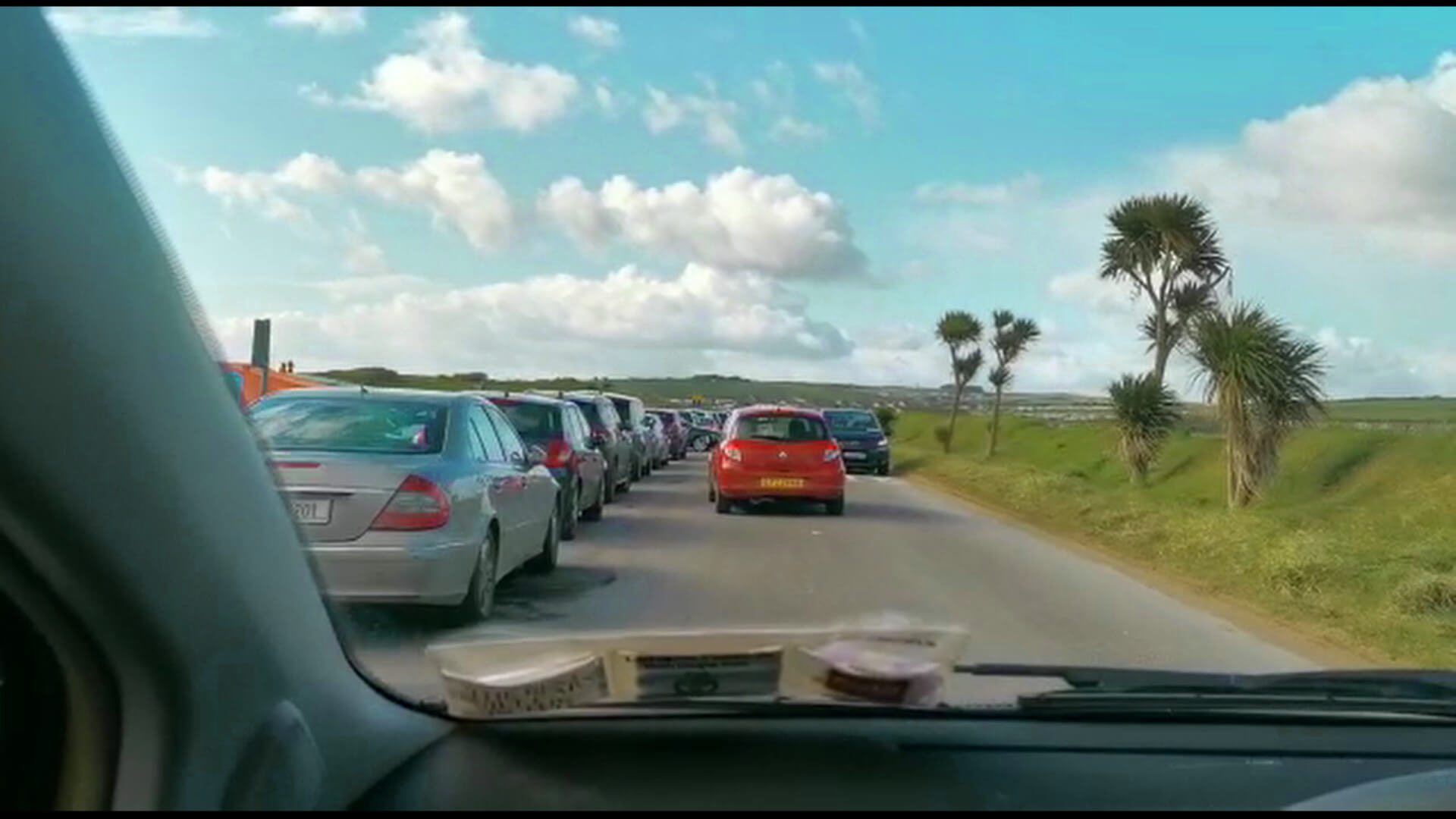
When did you realise that corona was going to be a big issue?
The first time I heard Taoiseach Leo Varadkar addressed the nation at the beginning of March. The Irish prime-minister is not often in the media and this was his 7th public appearance. This meant it is very serious. He started his speech with: “I need to speak to you about Coronavirus and Covid-19.” It was the day after the World Health Organisation formally described Covid-19 as pandemic and the European Centre for Disease Prevention and Control (ECDC) updated its guidelines advising all to act early to be effective.
When did you realise that corona was going to be a big issue in Kinsale in particular?
It’s not a big issue. It is an issue. It is what it is for the whole of Ireland. We haven’t had any cases in Kinsale yet and I hope it will stay that way. Kinsale is not a big town and the people, 99% of them, are obeying advice given by the government.
Close to Kinsale is the bigger city of Cork, and as any big city it has more problems as the population lives in closer proximity. Cork, by number of cases is in second place while Dublin leads.
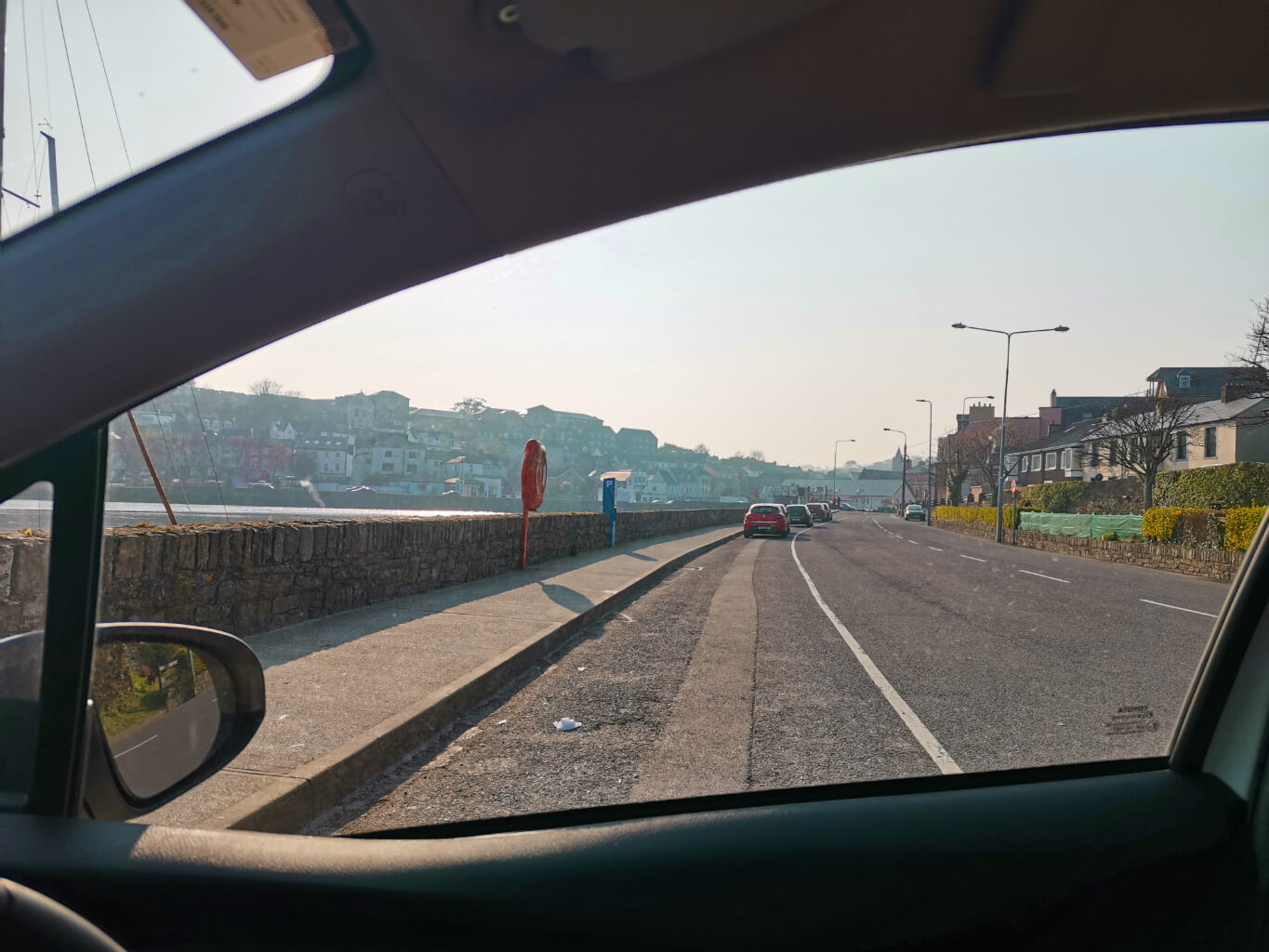
Give us a timeline on when and how life changed.
After the Taoiseach’s first speech (I think it was on 12th March) about corona, he announced that schools, colleges and childcare facilities will close until 29 March because of Covid-19, and indoor mass gatherings of more than 100 people and outdoor mass gatherings of more than 500 should be cancelled. That was the first time we were introduced with the term “social distancing” and the rule of two meters apart.
The second Taoiseach’s speech was on St. Patrick’s Day (17th of March) and it was the hardest and saddest celebration of St.Patrick’s ever. We listened with a knot in our stomachs to these words: ”So far the number of cases in Ireland has been relatively small. However, we believe that number will rise to fifteen thousand cases or more by the end of the month and rise further in the weeks thereafter.
"The vast majority of us who contract Covid-19 will experience a mild illness, but some will be hospitalised and sadly some people will die. We cannot stop this virus but working together we can slow it in its tracks and push it back.” At that point, the measures become more strict. Large public gatherings were cancelled. All pubs and bars were shut. Work from home whereever possible became the new policy. And a new motto was introduced ‘Come together as a nation by staying apart’
The third speech from the Taoiseach announced further Covid-19 restrictions, on 27th March, and everybody had to stay at home except in specific circumstances. This is where we are now. The restriction is until 12th April, but it can be prolonged. Specific circumstances means going to the store, pharmacy, doctors, essential work and 2km radius for brief physical exercising (alone or family living together). Other exemptions include farming, the care of animals and leaving home for vital family reasons such as providing care for the elderly or vulnerable.
Tell us about your day. Do you/can you leave your apartment?
We both work from home (as advised by the government). Having a job that is still ongoing during the crisis is a blessing. Not only a financial blessing, but also for our wellbeing, our mental health. We work the normal 8 hours a day. The only difference is that I need to cook more meals, lol, as my hubby is at home during his lunch breaks. My husband is going grocery shopping once a week as he can pay with his phone. It is advised not to pay with money, but by tapping a card or phone. The shops are well stocked.
After initial panic buying, yeah we did have that here too, almost every item is back in stock (still lacking sanitisers, some cleaning stuff, masks and gloves). It is so funny what people think it is necessary to stockpile. Our stores have specific times that are only for the elderly so they can have more protection. Weather permitting once a day we are going for a brief walk in a 2 km radius. We have some wonderful scenery in those 2 km. The only thing we are missing is people. Kinsale Baptist Church which we are members of is gathering through Zoom meetings online. Our social life is now mainly online. We had a surprise visit from our friends the other day. They live in the 2km radius from us. They walked their dog to our place and we talked through the balcony. We live in a building with 10 apartments. The door of the building now stays open all the time, so there is no need to touch the handle. Delivery services are working with no or slight delays. So far so good.
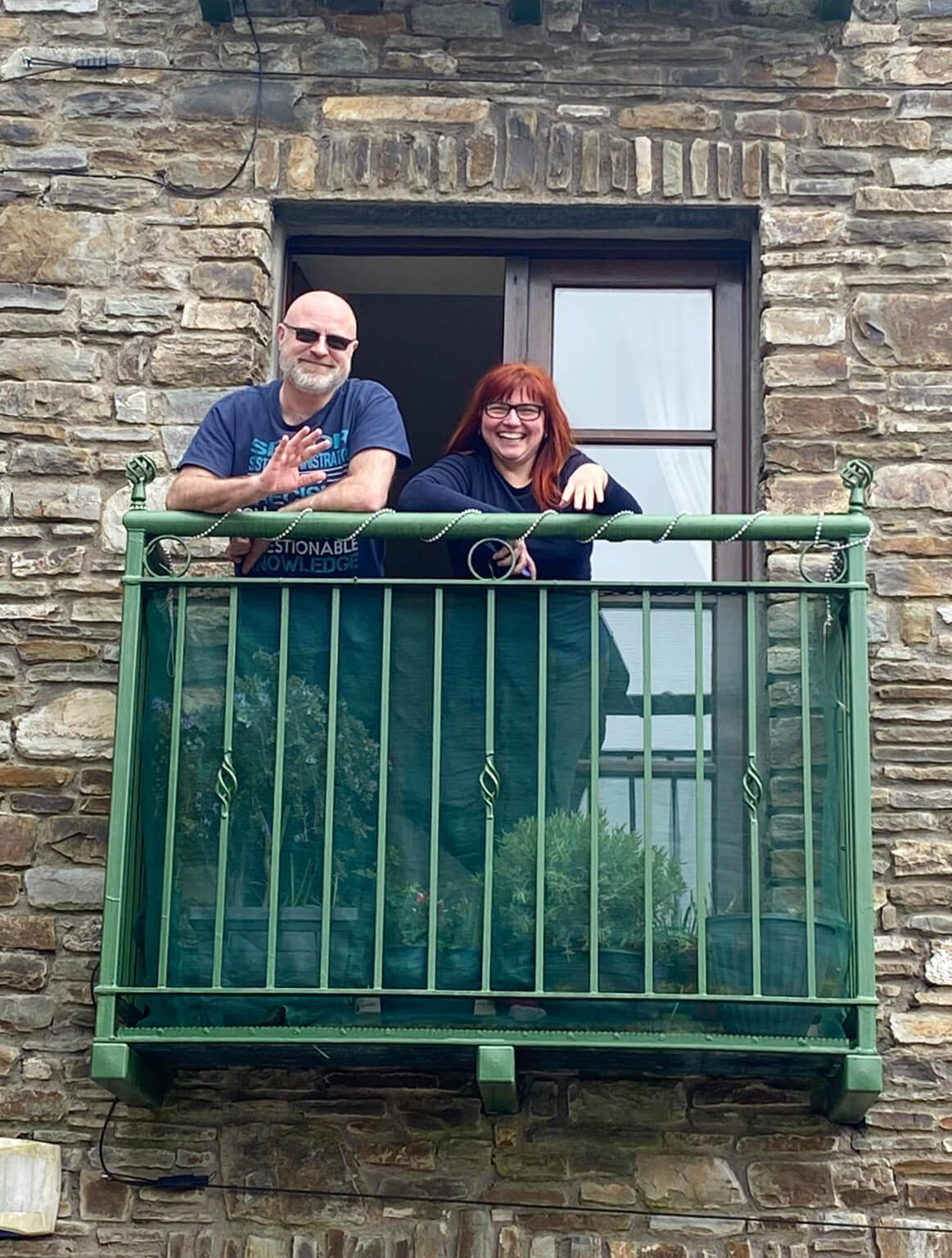
How are the authorities doing at handling the situation?
Every resource and help is used to fight it. Medical staff are working to the maximum. A lot of retired medical stuff even last year students joined in. The problem that Ireland has was from way back and that is a lack of beds in hospitals, lack of hospitals in general and lack of staff. That is our bottleneck. That is why is so important to flatten the curve and reduce the numbers. The authorities are doing their best in the given circumstances.
Another thing that mustn't be neglected is the significant impact on the economy. Ireland is in a very good position there. Ireland has the ability to pay welfare for all the people that can’t work anymore as a lot of businesses closed and a lot more will close in the future. And that welfare is not just “on the paper” as I first handedly know that it is already been delivered to some of my friends. Also, the Government is helping businesses to keep on working, there are several schemes that they can get the help needed.
This pandemic has a huge impact on so many levels and the Irish government by my humble opinion is doing the best in given circumstances.
You obviously keep an eye on your homeland. What is your impression of the way Croatia is dealing with the crisis?
I know that numbers in Croatia are low, which is really good. Whether these numbers are a good indicator or not probably depends about the number of tests each country is able to perform, or are the deaths linked to the death by coronavirus. I try not to read Croatian newspapers in the same way I avoid reading about corona here. Too much negative information is just not healthy. My main information about the situation in Croatia is from my family and friends and our conversations. I know that they are indoors, that schools are closed and that permits have been introduced. So apart from permits, it is similar to Ireland. My parents live in Zagreb and it was terrifying to listen and watch images after the earthquake. I was and still am worried about them and their health. Everything went well during the earthquake, none of my relatives and friends were hurt. As my parents are elderly, for me to be so far away and without the ability to visit them is hard. We had to cancel our flight to Zagreb in May. When we will be able to fly there is unknown. Scenes from Zagreb after the earthquake were worse than during the war. The devastation and empty streets painted an awful picture. My parents have support from neighbours and they can call doctors, there is the advantage of an electronic prescription for medicines and I know that contact with others is reduced. That is all good news for them and at the same time it is bad news as social isolation for the elderly is even tougher.
Croatia had a really excellent healthcare system. How much of that excellency is left after so many quality doctors left the country for better life in other countries, that I do not know.
Compare and contrast the responses of Croatia and Ireland. Who is doing what better?
This question is so competitive, so very Croatian.
The pandemic is an awful situation, where people's lives are in serious danger, not only because of the virus, but the potential collapse of the economy. In the beginning, when the situation started to develop in Europe, I had words similar to your question from my Croatian friends – who is (doing) better. It is so unlikely to hear something like that in Ireland. It is in the Croatian soil probably, the need to compete, I’m sure that is the reason that we are so good at sports, but this isn’t a sport.
This pandemic tests every single person, every government, and healthcare in the world. The response from Croatia and response from Ireland vary depending on the resources and abilities that are available. It also depends on the culture and landscape. If it’s more rural or a denser population it will make a difference. The things that I can talk about is how I dread for my Croatian friends who are already put on minimal wages the amount which in Croatia is not enough for a normal living. I worry about my friends whose sole living depends on tourism and now there is no tourism.
And I know that the Croatian government is not in the position to give those people enough financial help and on time which is also a crucial factor. I worry about my elderly friends in Ireland if they’ll end up in hospitals if it’s going to be enough respiratory ventilators, enough beds. These are the things that we can talk about. We can compare how heroic individuals are giving all their talents and abilities to help fellow citizens which is happening in Ireland as well as in Croatia. We can laugh at memes and jokes of panic buying or funny ways to survive the isolation that are ongoing in both countries. Good and positive stories in the midst of terrifying circumstances.
What about official communications from the authorities, compared to your home country?
I think that they both do a great job. The public is well informed and there is not much to say about the topic.
What's the one thing you wish you had taken with you into self-isolation?
Nothing actually. We have pretty much everything. Oh, no one thing I am missing, lol, henna. I have a though time to get a supply of henna dye for my hair. Now without hairdresser services I need to maintain my hairstyle as best I can (as many women today). Lush was my official supplier of henna and it is closed now and I really wish I had bought more of it while I had a chance.
One thing you have learned about yourself, and one thing you have learned about others during this crisis.
This is not my first major crisis that affects the whole nation. I learned before how different people's reactions can be. I learned how precious life is and how short it can be. Man is not in control of anything. Again and again, I see how some react selflessly, giving to society all they can and also the opposite, totally selfish actions. And then there are the special category of people which looks at how to gain profit from crisis – we saw plenty of them during the Croatian war – the lowest of the low.
If you could be self-isolating in Croatia, where would it be, and why?
The immediate answer would be on a fully stocked sailboat with good and unlimited Internet moored somewhere near one of many unpopulated islands in Croatia, haha, that’s the dream so many of us dream. Especially with summer coming and no way to see the Adriatic soon. But the reality is that closer to my parents would be great, so Zagreb would be the answer.
Thanks, Lidija. Stay safe and see you on the other side. You can see all the stories in both this diaspora series, and the one on expats in Croatia on this link.
TCN is starting a new feature series on Croatian diaspora experiences of sitting out COVID-19 abroad and comparing your experiences to the situation in Croatia. If you would like to contribute, the questions are below. Please also include a para about yourself and where you are from, and a link to your website if you would like. Please also send 3-4 photos minimum to This email address is being protected from spambots. You need JavaScript enabled to view it. Subject Corona Diaspora
If you would be interested to record a video version for our partners www.rplus.video please let us know in the email. Thanks and stay safe.
Self-Isolation Voices from the Diaspora
Firstly, how are you? Are you alone/with someone? Tell us a little about your situation and sanity levels.
When did you realise that corona was going to be a big issue?
When did you realise that corona was going to be a big issue in New York in particular?
Give us a timeline on when and how life changed.
Tell us about your day. Do you/can you leave your apartment?
How are the authorities doing at handling the situation?
You obviously keep an eye on your homeland. What is your impression of the way Croatia is dealing with the crisis?
Compare and contrast the responses of Croatia and USA. Who is doing what better?
What about official communications from the authorities, compared to your home country?
What's the one thing you wish you had taken with you into self-isolation?
One thing you have learned about yourself, and one thing you have learned about others during this crisis.
If you could be self-isolating in Croatia, where would it be, and why?
TCN has recently become a partner in Robert Tomic Zuber's new R+ video channel, initially telling stories about corona experiences. You can see the first TCN contribution from this morning, my video from Jelsa talking about the realities of running a news portal in the corona era below. If you would like to also submit a video interview, please find Robert's guidelines below
VIDEO RECORDING GUIDE
The video footage should be recorded so that the cell phone is turned horizontally (landscape mode).
There are several rules for television and video news:- length is not a virtue- a picture speaks more than a thousand words
In short, this would mean that your story should not last more than 90 seconds and that everything you say in the report should be shown by video (for example, if you talk about empty streets, we should see those empty streets, etc.).
How to do it with your cell phone? First, use a selfie camera to record yourself telling your story for about a minute and a half. Ideally, it would be taken in the exterior, except in situations where you are reporting on things in the interior (quarantine, hospital, self-isolation, etc.). Also, when shooting, move freely, make sure everything is not static.
After you have recorded your report, you should capture footage that will tell your story with a picture, such as an earlier example with empty streets.
One of the basic rules of TV journalism is that the story is told in the same way as a journalist with his text. Therefore, we ask you for additional effort. Because we work in a very specific situation, sometimes you may not be able to capture footage for each sentence of the report. In this case, record the details on the streets: people walking, the main features of the city where you live, inscriptions on the windows related to the virus, etc.
The same rules apply if you are shooting a story from your apartment, self-isolation, quarantine. We also need you to capture footage that describes your story.
When shooting frames to cover your reports, it is important that you change the angle of the shot (in other words, shoot that empty street from several angles). Also, when shooting a detail, count at least five seconds before removing the camera to another detail.
The material should be about 5 minutes long (90 seconds of your report + frames to cover your story).
After recording everything, send us to Zagreb, preferably via WeTransfer to This email address is being protected from spambots. You need JavaScript enabled to view it.
Epidemic Disrupts Rental Market in Zagreb
ZAGREB, April 5, 2020 - Uncertainties caused by the corona crisis have affected the rental market in Zagreb as well, where a drop in prices was registered even before the 22 March quake, it was noted in an analysis published by a real estate advertiser Crozilla.com.
"The uncertainty caused by the coronavirus situation left a mark on the rental market in Zagreb even before the major earthquake, which exacerbated this difficult situation. The flat rental market, both monthly and daily, is already suffering from the consequences of the emerging developments," Crozilla stated.
According to the Crozilla advertiser's data, rents for flats in Zagreb were slightly lower compared to February even before the earthquake. Advertised rents for flats with areas from 20 to 100 square metres were down by 1% on average, however, despite the declining trend, rents were still higher compared to March 2019 and 2018.
The most considerable change is evident when it comes to smaller flats, rents for which had increased the most before this crisis.
The sharpest decrease in prices was registered for flats up to 40 square metres, for which rents are down 2.1% on average compared to February. A slightly smaller fall was registered in rents for flats from 40 to 60 square metres, which are down 1.3% compared to February.
Rents for flats from 60 to 100 square metres decreased by 0.7% on average compared to the previous month.
Apart from slightly lower prices, due to the coronavirus situation, a decrease in demand was also registered at the rental market in Zagreb.
Crozilla.com quoted Andrea Bilić, the director of the Metropola real estate agency, who emphasised that the coronavirus had paralysed the real estate market, and currently put on hold all activities connected to rental demand.
"Many foreign embassies are cancelling already arranged showings, and some clients give up on renting or moving after they look at the property and even after they had already decided to rent a particular property due to the current circumstances. One of the biggest problems is quarantine for all foreign citizens who have employment contracts with foreign companies and who were due to start working in Zagreb soon," Bilić said.
Bilić estimates that further developments in prices for renting flats will depend on the duration of the crisis.
"If it ends in a month, which is unlikely according to experts, only a minor and not very significant drop in prices will happen. However, if it stretches over a period of several months, it will bring more uncertainty, and it will generate a global crisis, and in that case, there could be a repeat of the 2008 crisis, which is still very fresh in our memories," Bilić thinks.
Along with the monthly rent market, changes were registered in the daily rent market as well. However, in that case, not even price reduction could help, said to Crozilla Bruno Babić, the head of the "Apartments in the centre of Zagreb" association, which numbers 15 apartments located in the very centre of Zagreb.
"Prices are not dropping in a competition for guests. You can stay for free, but every guest must first go to isolation for 14 days, and the vacation becomes too expensive, no matter how cheap the accommodation," stated Babić, adding that they currently have no guests, as their business is based on exclusively on tourists.
More economic news can be found in the Business section.
SSSH: Employers Should Be Entitled to Subsidies If They Re-Employ Sacked Workers
ZAGREB, April 5, 2020 - The SSSH trade union federation suggested on Sunday that companies that had fired workers due to the corona crisis should be entitled to job retention subsidies provided that they hired the same workers on a permanent basis.
The SSSH recalls that it has recently called on employers not to panic and hastily dismiss workers, urging them to show patience, social responsibility and dialogue.
Following the latest set of measures proposed by the government to prop up businesses and save jobs, the Croatian Employers' Association (HUP) earlier on Sunday welcomed the announcement by the Labour Ministry that grants for saving jobs during the corona crisis will also be made available to companies that were forced to lay off workers before the latest set of government measures.
The HUP said on Sunday that it was pleased with the ministry's announcement that the Croatian Employment Service (HZZ) steering board would on Monday grant the HUP's request that employers who had had to dismiss workers due to the crisis, before the government designed the so-called April package of measures, would also be entitled to subsidies as envisaged in that latest set of measures.
The SSSH said today that it also supported the HUP's request for enabling employers who dismissed in a hastily manner workers at the start of the corona crisis to apply for subsidies provided that they re-employ those workers on a permanent basis.
The SSH also called for prevention of misuse of state subsidies.
More coronavirus news can be found in the Lifestyle section.
SDP Unveils 10-Measure Package to Help Citizens Worst Hit by Coronavirus
ZAGREB, April 5, 2020 - Social Democratic Party (SDP) leader Davor Bernardić on Sunday presented a 1.7-billion-kuna rescue package designed by this Opposition party to help those citizens who are hardest hit by the crisis caused by the COVID 19 epidemic.
At the start of the news conference in Zagreb, the SDP chief recalled that due to the crisis 400,000 jobs in the country are at risk, and furthermore 20,000 workers have been already fired, while 37,000 persons registered by the Croatian Employment Service (HZZ) receive the monthly dole of HRK 2,600, while more than 100,000 unemployed persons are without any social welfare allowance.
Commenting on the hardship which those citizens with blocked accounts and citizens with monthly income below the poverty threshold are experiencing, Bernardić said that the 10-measure package was intended for those out of work, social welfare recipients, pension recipients and for all "who can barely make ends meet".
Under the SDP package, 20,000 people who are now out of work due to the corona crisis would be entitled to the monthly allowance of HRK 4,000.
Those 100,000 unemployed persons who he said could not find employment due to the crisis would be entitled to the monthly allowance of HRK 1,625.
Commenting on the troubles bothering 5,500 permanent seasonal workers, Bernardić said that the SDP set of measures would provide for 3,250 kuna every month to them plus social welfare benefits to which some of them are entitled.
Bernardić said the SDP would enable 750 kuna as a supplement to each pensioner with the monthly income up to 1,939 kuna.
He said that those measures encompassed 400,000 citizens.
The SDP also proposes that pensioners with low incomes should be exempt from paying monthly TV fee.
The SDP is in favour of suspension of enforcement, the party leader said, among other things.
He reiterated that this party would insist on a year-long moratorium on repayment of loans unlike the government's proposal for a three-month-long moratorium.
More SDP news can be found in the Politics section.
Foreigners Self-Isolating in Croatia: Do You Feel Safer? Tash from New Zealand
April 5, 2020 - Do foreigners in Croatia feel more or less safe sitting out COVID-19 here than in their home country, and what are their experiences? A new series on TCN, with Tash Pericic from New Zealand in Dugi Rat as our 27th contributor.
Oxford University recently published some research on government responses to coronavirus which showed that Croatia currently has the strictest measures in the world. While inconvenient, this is a good thing in terms of reducing the spread of the virus, and I am certainly not alone in my admiration of the official Croatian handling of this crisis in recent weeks, both in terms of action and communication.
But what do other expats here think? And how does it compare with the response in their home country? Would they rather sit this one out here or there? In the first of a new series on TCN, we will be featuring expats from all over the world to see what their views are on life in corona Croatia rather than back home. So far we have heard from expats in Croatia from Romania, USA, Ireland, UK, Mexico, Argentina, Spain, Singapore, Holland, Canada, India, Hong Kong, Venezuela, Latvia, China, Honduras, Hungary, Moldova and Germany. Next up, Tash Pericic from New Zealand in Dugi Rat.
If you would like to contribute to this series, full details are below. Now, over to Tash.
Firstly, how are you? Are you alone/with someone? Tell us a little about your situation and sanity levels.
I am doing ok, I am isolated with my husband and two fur babies in Dugi Rat, just outside of Split. Our circumstance is actually very surreal because we have been working in tourism (on yachts) for years and were in the process of trying to buy our own yacht but the deal fell through. At the end of last year, we signed an agreement to work as crew for a private owner (so, not reliant on tourism). We never could have predicted this pandemic but are obviously very fortunate. At the beginning, I actually felt guilty for being ok financially but then I realised guilt helps no one. We are thankful to be in a position where we can help others and feel even more driven to do so.
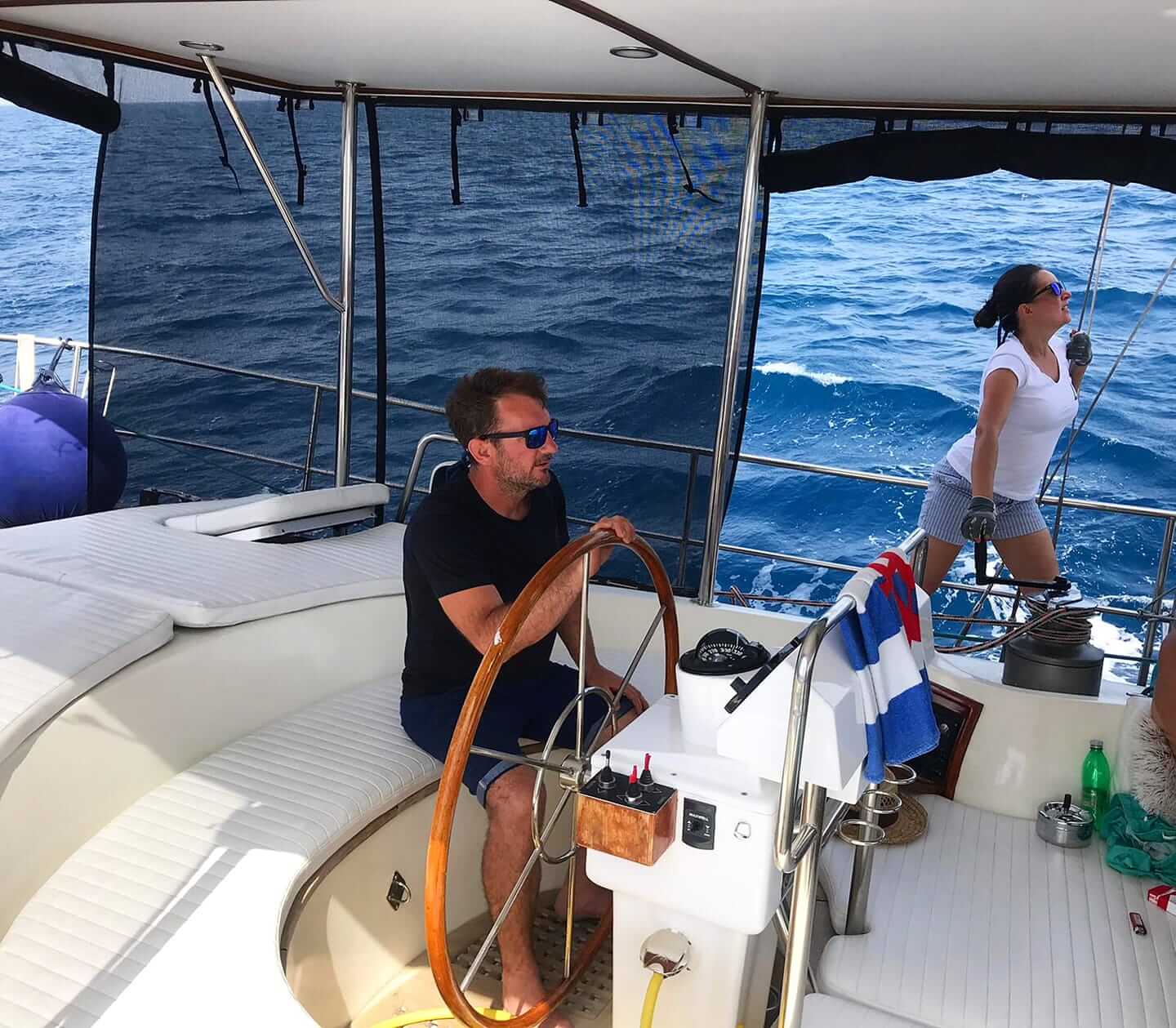
We should be sailing right now...
We have been in self-isolation for 3 weeks now and honestly, it has gone quite quickly. However, we can’t complain as our situation is different to many: we have our health, we don’t have kids, we own our apartment and our income isn’t affected (for now). I am not saying this to be a smug son of a b*tch, I am saying this to preface and explain that isolation for us, doesn’t come with most of the stresses many are facing; hence, we have the energy to try and use this time productively.
This means our sanity levels are also fine. While I am definitely a social person; we work seasonally, so every winter we typically ‘self-isolate’ for a period and are used to finding ways to keep ourselves occupied. Luckily, we have a small radionica (workshop) in our basement to keep my husband busy – building furniture is his side passion. For myself, I have my writing (I recently penned an article about hope in these times) and have just started Croatian lessons via Skype; so, this is more than enough to occupy my time.
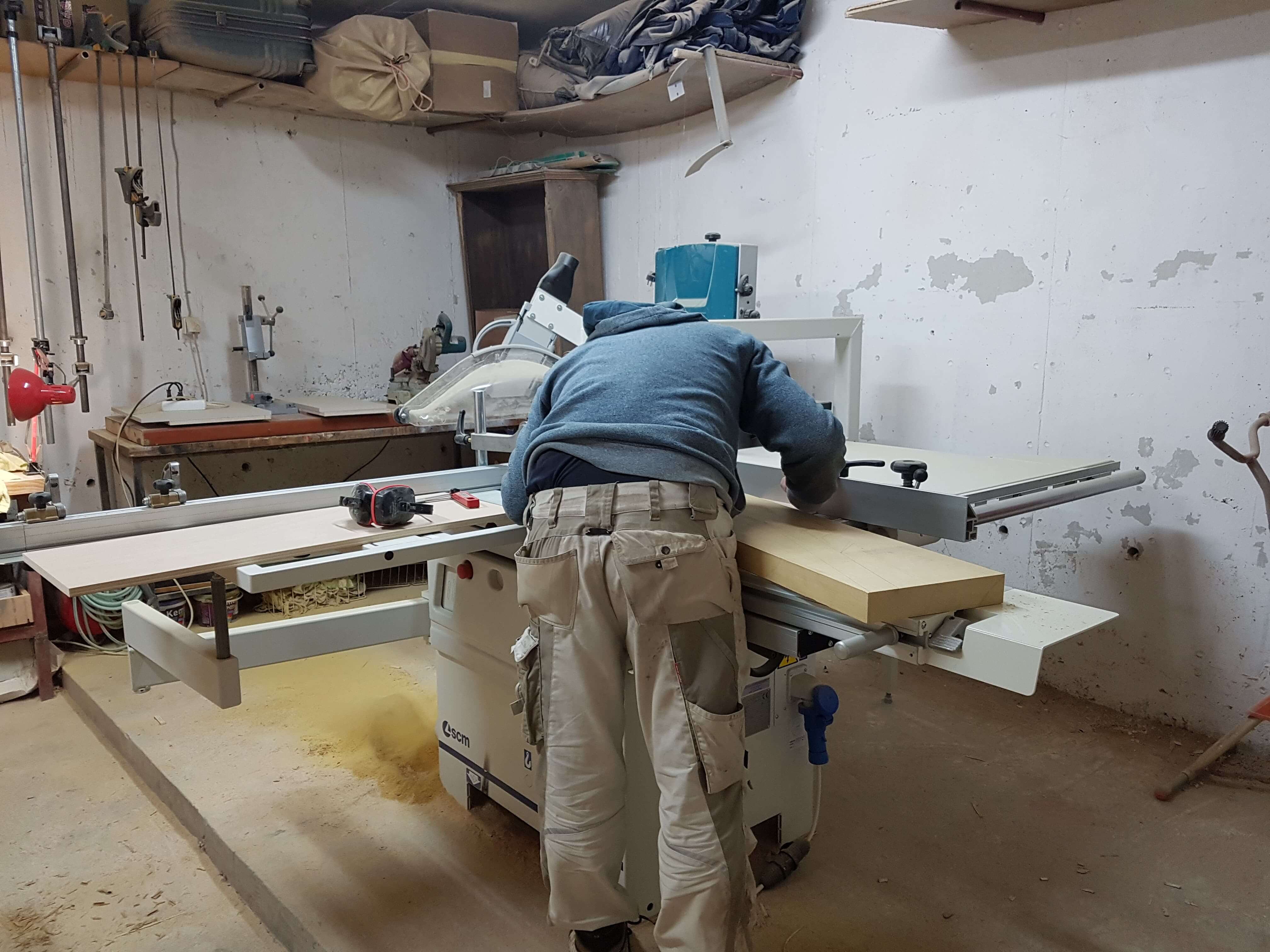
My husband keeping busy in his workshop
When did you realise that corona was going to be a big issue?
Like many, I think I honestly didn’t take it seriously until measures were announced to start closing borders and then came lockdown. It feels like it all happened so fast. Maybe it is a sign of our times that we are so desensitised to news but I feel that no one (or not many) comprehended and could have predicted the situation we are in. We’ve heard of the Spanish flu but this still feels unprecedented; not in my wildest dreams could I have imagined this, yet here we are.
What is your impression of the way Croatia is dealing with the crisis? How safe do you feel?
I am beyond impressed with how Croatia is handling this crisis. Honestly, I really didn’t expect such a response and I definitely didn’t expect people to take it so seriously. Yet, after the news was announced about being on lockdown, people were immediately off the streets where I live, the local playground was closed and covered, and social-distancing measures were put in place in the local supermarket, post office etc. While it all still feels a little eerie, I feel extremely safe living here in Croatia right now. Svaka čast Hrvatska!
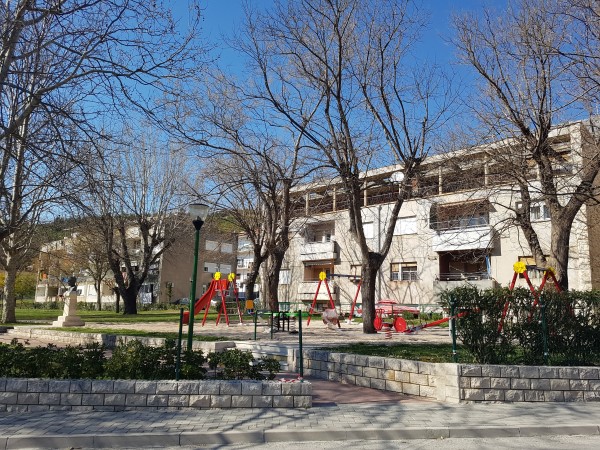
Our local park has been child-free since lockdown began
Now compare that to your home country and how they are handling it. What is Croatia doing better/worse?
I feel safe and happy to be living in Croatia; however, New Zealand is also handling it well. I think the Prime Minister, Jacinda Ardern, is one of the finest examples of leadership that we currently have in the world. Ardern’s communication is clear, concise and compassionate; they are also in lockdown, whereas their neighbour Australia is sending mixed messages and seems reluctant to take a strong stance one way or the other. I do have to boast, does anything really beat seeing the Prime Minister of a country doing live Q&A sessions on Facebook in comfy home clothes?
I can’t say that Croatia is handling things better or worse than New Zealand; I haven’t studied all communications and policies but from where I stand, both are doing an exceptional job at trying to flatten the curve, communicate clearly and take care of their citizens. I believe new economic measures are to be announced tomorrow in Croatia for ways the government plans on helping businesses. Considering a substantial chunk of Croatia’s GDP is reliant on tourism (around 20%), I am sure the Croatian government understands that it is in their best interest to protect their people and business owners; I am hoping for the best for all.
What about official communications from the authorities, compared to your home country?
Again, I think both countries are doing this well, there is clear information coming from both countries frequently and both seem to be using technology to their advantage – using all forms of media and social media to get their messages across. I watched TV for the first time yesterday and noticed that all of the ads are geared around staying inside and there is even a permanent watermark in the corner saying to stay home #ostanidoma. This blew me away. As a foreigner, I obviously can’t keep up with all of the Croatian news but thanks to TCN I feel informed. I also need to mention the articles by Igor Rudan which are some of the best articles I have read about Covid-19 and the situation we are in; these articles helped me comprehend the situation better – thank you Igor (and Lauren for translating)!
What's the one thing you wish you had taken with you into self-isolation?
Some resistance bands for training and a ukulele. The resistance bands explain themselves and I’ve always wanted to learn to play the ukulele. Mind you, writing and studying Croatian is keeping me busy enough, so it probably would have ended up on a shelf gathering dust like my guitar…
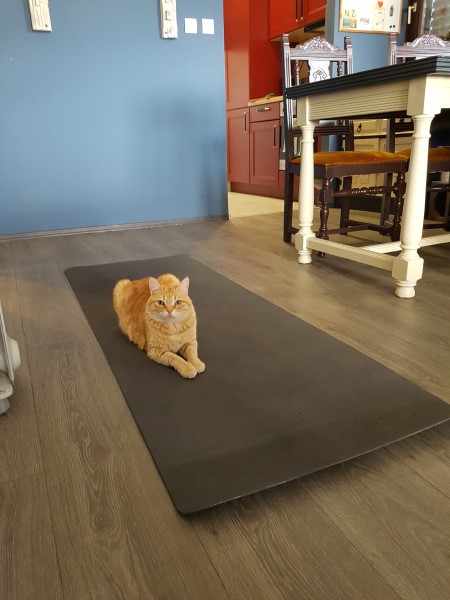
I'll settle for yoga with my fur babies.
One thing you have learned about yourself, and one thing you have learned about others during this crisis.
Big question, how long do you have? Seriously, I have learned a lot, this stillness is a great time to pause and reflect. I saw a post which read: “I feel like we’ve all just been put on the naughty step and been told to think about what we’ve done.” Which kinda sums it up; none of us would choose to be in this situation but now that we’re here, I believe we need to take the time to question our lives and values.
I have been doing a lot of digging into myself and questioning whether I am living out my values. While I feel ‘on track’ in a general sense, something that has come up for me is that I realised that I am still holding myself back in many ways. We all have that little voice that tries to keep us playing ‘small’ where it’s safe and I realised that I have been listening to it too often. One big positive that has come out of this for me is that I have glimpsed the absurdity of fear and self-doubt; considering everything can be taken away in the blink of an eye, protecting ourselves by playing small is ridiculous. And, considering everything going on in the world – does fear of what others think or self-doubt really have legs to stand on? For me, the answer is no.
What I have I learned about others during Crisis? I have learned that we all respond differently in crisis; it is even likely that we will flow between various stages during this period: disbelief, anger, frustration, helplessness, acceptance… In fact, it is very similar to the stages of grief. Perhaps it is a sort of grief we are experiencing, grieving over the world we have ‘lost’ and confused about how to begin again. This time will undoubtedly bring out the best and worst in people – I see initiatives to help community cropping up, just as I see actions of greed and selfishness (the whole toilet paper drama is a good example of this), I see kindness and support on social media, just as I see judgment and criticism. What stands out to me through all of this is that now more than ever, we need to practice compassion – compassion for ourselves and others. It is a strange time for all of us, so I am trying to be far kinder to myself and find compassion for others. If I see behaviour I don’t agree with, I have been reminding myself “maybe they aren’t their best right now, you don’t know what they’re struggling with” – ironically, isn’t this how we should always treat people?
This is what has been coming up for me, as you can see, with less stresses, my mind has switched to the philosophical element of it all.
Thanks, Tash, stay safe and see you on the other side.
TCN is starting a new feature series on foreign experiences of sitting out COVID-19 here in Croatia compared to their home country. If you would like to contribute, the questions are below. Please also include a para about yourself and where you are from, and a link to your website if you would like. Please also send 3-4 photos minimum to This email address is being protected from spambots. You need JavaScript enabled to view it. Subject Corona Foreigner
If you would be interested to record a video version for our partners www.rplus.video please let us know in the email. Thanks and stay safe.
Foreigners Self-Isolating in Croatia: Do You Feel Safer Than in Your Home Country?
Firstly, how are you? Are you alone/with someone? Tell us a little about your situation and sanity levels.
What do you think about the economic measures the government is taking, are they helping your business? (PLEASE IGNORE IF THIS DOES NOT AFFECT YOU)
When did you realise that corona was going to be a big issue?
What is your impression of the way Croatia is dealing with the crisis? How safe do you feel?
Now compare that to your home country and how they are handling it. What is Croatia doing better/worse?
What about official communications from the authorities, compared to your home country?
What's the one thing you wish you had taken with you into self-isolation.
One thing you have learned about yourself, and one thing you have learned about others during this crisis.
TCN has recently become a partner in Robert Tomic Zuber's new R+ video channel, initially telling stories about corona experiences. You can see the first TCN contribution from this morning, my video from Jelsa talking about the realities of running a news portal in the corona era below. If you would like to also submit a video interview, please find Robert's guidelines below
VIDEO RECORDING GUIDE
The video footage should be recorded so that the cell phone is turned horizontally (landscape mode).
There are several rules for television and video news:- length is not a virtue- a picture speaks more than a thousand words
In short, this would mean that your story should not last more than 90 seconds and that everything you say in the report should be shown by video (for example, if you talk about empty streets, we should see those empty streets, etc.).
How to do it with your cell phone? First, use a selfie camera to record yourself telling your story for about a minute and a half. Ideally, it would be taken in the exterior, except in situations where you are reporting on things in the interior (quarantine, hospital, self-isolation, etc.). Also, when shooting, move freely, make sure everything is not static.
After you have recorded your report, you should capture footage that will tell your story with a picture, such as an earlier example with empty streets.
One of the basic rules of TV journalism is that the story is told in the same way as a journalist with his text. Therefore, we ask you for additional effort. Because we work in a very specific situation, sometimes you may not be able to capture footage for each sentence of the report. In this case, record the details on the streets: people walking, the main features of the city where you live, inscriptions on the windows related to the virus, etc.
The same rules apply if you are shooting a story from your apartment, self-isolation, quarantine. We also need you to capture footage that describes your story.
When shooting frames to cover your reports, it is important that you change the angle of the shot (in other words, shoot that empty street from several angles). Also, when shooting a detail, count at least five seconds before removing the camera to another detail.
The material should be about 5 minutes long (90 seconds of your report + frames to cover your story).
After recording everything, send us to Zagreb, preferably via WeTransfer to This email address is being protected from spambots. You need JavaScript enabled to view it.
You can find more musings from Tash on her website or Instagram.

